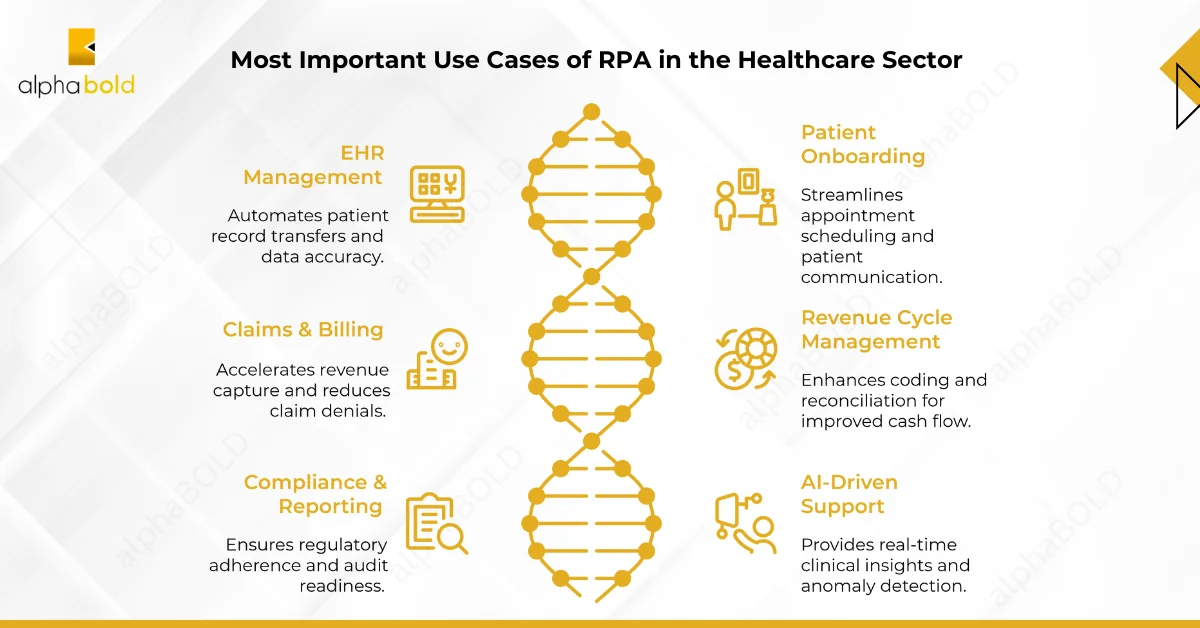Table of Contents
Introduction
Healthcare professionals face a growing list of challenges—staff shortages, rising administrative work, and the pressure to improve patient outcomes with limited resources. In this environment, RPA in healthcare offers a straightforward way to ease the load. By automating repetitive tasks like appointment scheduling, billing, and data entry, RPA helps free up time for clinicians and staff to focus on work that directly impacts patient care. It’s a practical solution that improves efficiency without requiring significant system changes.
What Is RPA in Healthcare?
RPA in healthcare utilizes bots in software form to perform tasks a human would do on a computer, such as data entry, data cross-checking, and many more. Bots can log in to different applications, obtain and alter data, and provide certain responses all by themselves. RPA’s key characteristic is the functioning of a digital workforce, which helps to streamline monotonous, repetitive, and time-consuming tasks. The healthcare robotic process automation (RPA) market is projected to expand significantly, reaching approximately $3.97 billion by 2029, with an estimated compound annual growth rate (CAGR) of 14.8%.
Most Important Use Cases of RPA in the Healthcare Sector

EHR Management & Interoperability:
Patient Onboarding & Appointment Scheduling:
Claims & Billing Management:
Revenue Cycle Management (RCM):
Compliance & Regulatory Reporting:
AI-Driven Clinical Decision Support:
RPA in healthcare, when integrated with AI, allows the analysis of unstructured clinical data to provide real-time support to clinicians by highlighting treatment options while flagging any anomalies.
Further Reading: Robotic Process Automation – An Introduction
Modernize Legacy Systems with Intelligent Automation
Leverage AlphaBOLD's expertise in bridging outdated platforms through APIs, AI, and low-code bots. Our solutions for healthcare workflow automation enable seamless modernization — without disrupting day-to-day operations.
Request a ConsultationRPA Implementation Advantages in Healthcare
Operational Cost Reduction:
Optimized Savings:
Elevated Accuracy and Compliance:
Improved Patient Interactions Experience:
Enhanced Staff Productivity:
Challenges in Adopting RPA in Healthcare
Data Security & Compliance Risks:
Healthcare data is very sensitive. Bots managing Protected Health Information (PHI) must function under rigid encryption, role-based access, and audit trail protocols, fulfilling HIPAA and GDPR.
Integration with Legacy Systems:
Numerous providers operate on siloed and aged platforms. Closing the gaps in these systems often requires middleware or APIs and, at times, a hybrid approach that includes RPA in healthcare and Artificial Intelligence to handle unstructured data interpretation.
Limited Skilled Workforce:
Resistance to Change:
Cost of Implementation:
Future Outlook
Shifting toward the pacing activities of 2025 and later, RPA in healthcare is advancing toward HyperAutomation, RPA with AI, machine learning, and process mining to automate workflows with minimal human input.
Real-time predictive clinical assistance and proactive command operations will only be possible using AI-augmented RPA bots that manage unstructured data and linguistic processing. Moreover, organizations will begin to accept low-code systems that enable the clinical and administrative staff to create bots, thus eliminating silos.
Further Reading: The Complete Guide to Preparing Your Data for AI Success
Automate Smarter with AI-Enabled RPA for Healthcare
Reduce operational costs, improve compliance, and eliminate manual errors by integrating AI-powered RPA workflows built specifically for healthcare providers.
Request a ConsultationFinal Thoughts
RPA in healthcare allows leadership to reduce administrative overhead, cut operational costs, and redirect resources toward improving patient outcomes. It’s not a one-size-fits-all solution, but when implemented thoughtfully, RPA can relieve overburdened teams, improve accuracy, and support more efficient workflows across departments. The key is to start with a targeted, high-impact use case, time-consuming but easy-to-automate processes. From there, organizations can build internal expertise, expand automation efforts, and explore advanced capabilities like AI-driven decision support and low-code development. In a healthcare system under pressure, small wins from RPA can quickly add to meaningful change.
If your organization is exploring automation, our team at AlphaBOLD can help you identify the right starting points and build a roadmap that fits your needs. Request a consultation today!
Explore Recent Blog Posts









